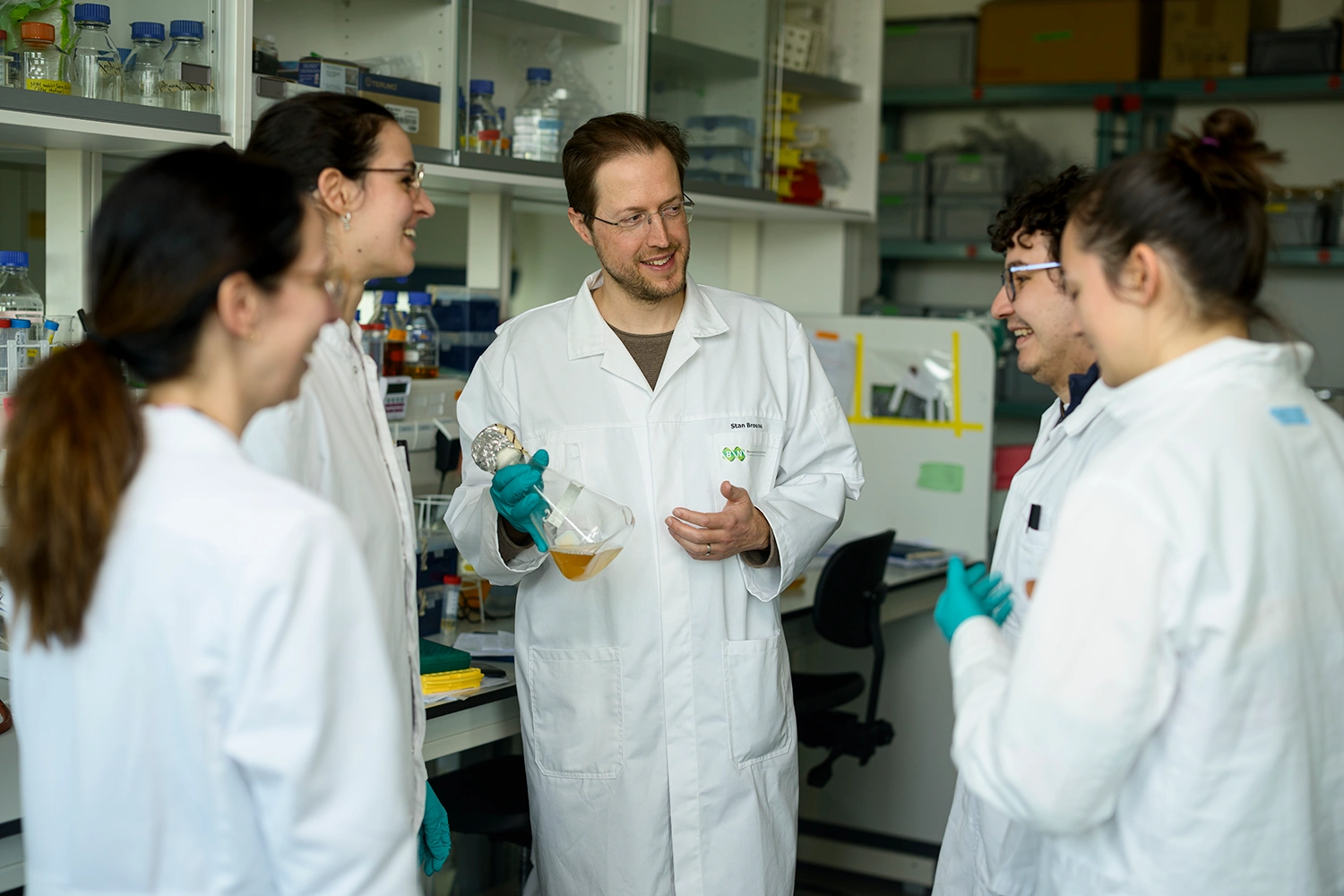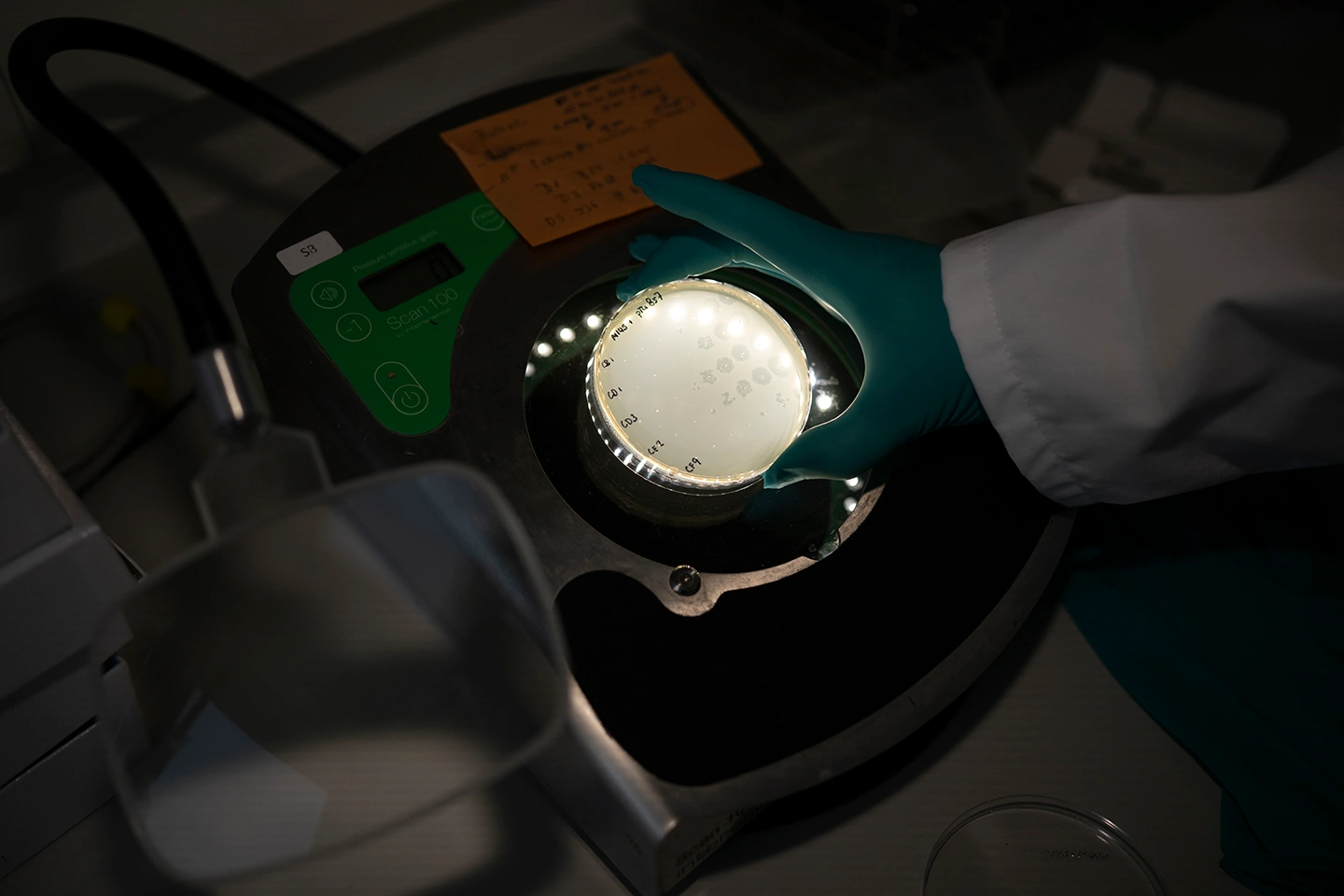Stan Brouns: ““Bacteria eventually adapt and change their DNA, which makes antibiotics less effective.”
Text Jeroen van Aken
© Photos Marcel Krijger
Imagine a simple infection that is treatable today but could be life-threatening tomorrow. The overuse of antibiotics has led to more and more bacteria becoming resistant, with serious consequences: conservative estimates suggest 10 million deaths a year by 2050.
While a global search for new antibiotics is underway, microbiologist Stan Brouns, professor of Molecular Biology at TU Delft, is exploring a different route: bacteriophages. These natural enemies of bacteria offer a promising solution and Brouns’ groundbreaking work aims to ensure that the first patients in the Netherlands can soon benefit from this treatment. Alumni support can help make this possible. The problem of antibiotic resistance has been caused by years of overuse. “Antibiotics are cheap and widely used,” explains Stan Brouns. “They even used to be added to cattle feed or drinking water for chickens to enhance growth. While this may work for a while, bacteria eventually adapt and change their DNA, which makes antibiotics less effective.”
10 million deaths in 2050
Antibiotic resistance is a silent killer. It is not something like COVID that suddenly affects everyone, but it is steadily increasing. And while not every chronic infection is immediately fatal, it can have a major impact on quality of life. Forecasts for 2050 speak of 10 million deaths a year globally, mainly due to deadly bacteria such as tuberculosis, which are becoming increasingly resistant to antibiotics.

Brouns and his team aim to continue growing the phage bank with new donations.
‘This preparatory work is essential for the future treatment of patients in the Netherlands’
Bacteriophages as alternative to antibiotics
Like antibiotics, bacteriophages (also called phages) kill bacteria. The difference is that antibiotics work against several types of bacteria simultaneously, while a phage works against one specific type. The advantage of this is that the phage ignores the good bacteria and you can use them in a very targeted way. The rise of antibiotic resistance has caused a growing interest in this therapy in the West. We need to scientifically prove the safety and efficacy of the therapy and identify when it can be used most effectively.
Researcher profile
Name Stan Brouns (46)
Expertise moleculair microbiologist
Faculty Applied Sciences
Working on treatment with bacteriophages as an alternative to antibiotics
Impact treatment of chronic infections caused by resistant bacteria
Donation spending expansion of phage bank and research into phage effectiveness
Why TU Delft
“Delft has a rich history in microbiology. It is the city of Antonie van Leeuwenhoek, the founder of microbiology, and of Martinus Beijerinck, who came up with the term ‘virus’. Beijerinck conducted his groundbreaking work on viruses and microbes in his lab near the bridge over the Schie in Delft. It’s from there that the Delft school of microbiology emerged. We have a very talented team to make this research a success.”
Phage bank
Thanks to the financial support of Delft alumni, Stan Brouns was able to set up the Netherlands’ first phage bank in 2019. “This bank houses the bacteriophages that are effective against two of the most problematic bacteria in the Netherlands. There is still a lot of potential to expand the phage bank. “Worldwide, there are about 10 types of bacteria for which alternative treatments are urgently needed. Unfortunately, our limited budget means that we do not have suitable bacteriophages for all 10 in our bank. Expanding the phage bank will allow us to help even more people.” Alumni contributions will enable Stan Brouns to further expand the phage bank and increase knowledge about bacteriophages. “Alumni laid the foundation for the development of our current phage bank, and new donations will be used for further expansion and to conduct more research into the most effective phages. This preparatory work is essential to start treatment of patients in the Netherlands.”

Worldwide, there are about 10 types of bacteria for which alternative treatments are urgently needed.
Within two years
Stan Brouns aims for the first patients in the Netherlands to be treated with bacteriophages within two years and for the treatment to cure them of their infection. In the Netherlands, TU Delft, along with UMC Utrecht, has made the most progress in making this possible.
“There is no golden business model for bacteriophages. This is why commercial parties are not stepping in and developments are slow, which is precisely why donations are so important to getting this off the ground.“
Tech for Impact 2025
Will you join us?
Delft University Fund supports projects that have an impact on society, such as Stan Brouns’ research. And we need your support! Apart from the research into antibiotic resistance, three more projects by top researchers are selected for the Tech for Impact campaign.
1. Quantumchips
Dr. Anasua Chatterjee (Applied Sciences) is developing a quantum chip that can be produced on a larger scale and can be made accessible to students and researchers in Delft. There is a shortage of well-trained experts in the field of quantum technology, and major investments are needed to prevent Europe from falling further behind the US and China. With a donation, you invest in top Delft talent in quantum technology.
2. A safe coast
Our coastline protects a large part of the country from flooding. But is it resilient enough to withstand even the most extreme weather conditions? Dr.ir. Bram van Prooijen (Civil Engineering & Geosciences) is researching the impact of water and wind on our coastline. A team of well-trained students – the stormtroopers – brave Dutch storms to collect data on the beach. With a donation, you invest in a safe coastline.
3. Accelerating the Energy Transition with AI
Prof. Dr. Mathijs de Weerdt and fellow researcher German Morales (Electrical Engineering, Mathematics & Computer Science) recognize that our current energy system is at its limits. The electricity grid is almost full, and major investments are needed. With a groundbreaking computational model that uses smart algorithms, the researchers aim to help policymakers make the right investment decisions. With a donation, you invest in a future-proof energy system.
Which impactmaker can count on your support? Check out the projects: Delft technology for a better society
Tech for Impact talks
The four researchers each provide a one-hour online Tech for Impact Talk. Stan Brouns and Bram van Prooijen held their presentations in May and June. After the summer, Anasua Chatterjee and Mathijs de Weerdt will have their turn. All talks can be listened to via tudelft.nl/techforimpact
